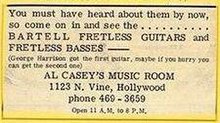
"Helter Skelter" is a song by the English rock band the Beatles from their 1968 album The Beatles. It was written by Paul McCartney and credited to Lennon–McCartney. The song was McCartney's attempt to create a sound as loud and dirty as possible. It is regarded as a key influence in the early development of heavy metal. In 1976, the song was released as the B-side of "Got to Get You into My Life" in the United States, to promote the Capitol Records compilation Rock 'n' Roll Music.
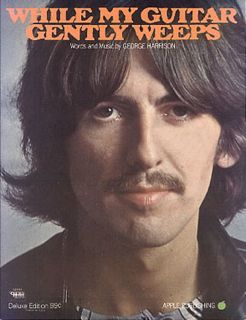
"While My Guitar Gently Weeps" is a song by the English rock band the Beatles from their 1968 double album The Beatles. It was written by George Harrison, the band's lead guitarist. Harrison wrote "While My Guitar Gently Weeps" as an exercise in randomness inspired by the Chinese I Ching. The song conveys his dismay at the world's unrealised potential for universal love, which he refers to as "the love there that's sleeping".
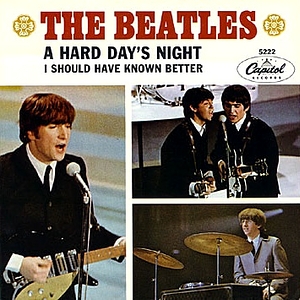
"A Hard Day's Night" is a song by the English rock band the Beatles. Credited to Lennon–McCartney, it was written by John Lennon, with some collaboration from Paul McCartney. It was released on the film soundtrack of the same name in 1964. It was also released as a single in the UK, and in the US

"Because" is a song written by John Lennon and recorded by the English rock band the Beatles. It was released on their 1969 album Abbey Road, immediately preceding the extended medley on side two of the record. It features a prominent three-part vocal harmony by Lennon, Paul McCartney and George Harrison, recorded three times to make nine voices in all.

"Happiness Is a Warm Gun" is a song by the English rock band the Beatles from their 1968 album The Beatles. It was written by John Lennon and credited to the Lennon–McCartney partnership. The song was composed into three distinct sections, referred by Lennon as "the Dirty Old Man", "the Junkie" and "the Gunman ". He derived the title from an NRA magazine and explained that the lyrics were a double entendre for guns and his sexual desire for Yoko Ono.

"Run for Your Life" is a song by the English rock band the Beatles from their 1965 album Rubber Soul. It was written primarily by John Lennon, though credited to Lennon–McCartney.

"The Night Before" is a song by the English rock band the Beatles from their 1965 film Help! and accompanying album Help! The song was written by Paul McCartney and credited to Lennon–McCartney.

"You're Going to Lose That Girl" is a song by the English rock band the Beatles from their 1965 album and film Help! Credited to the Lennon–McCartney songwriting partnership, the song was mostly written by John Lennon with contributions from Paul McCartney.

"You Like Me Too Much" is a song by the English rock band the Beatles. It was written by George Harrison, the group's lead guitarist, and released in August 1965 on the Help! album, except in North America, where it appeared on Beatles VI. The band recorded the track on 17 February that year at EMI Studios in London.
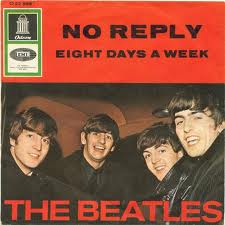
"No Reply" is a song by the English rock band the Beatles from their 1964 album Beatles for Sale. In North America, it was issued on Capitol Records' variant on the British release, Beatles '65. The song was written mainly by John Lennon and credited to Lennon–McCartney. Lennon originally gave the song to another artist managed by Brian Epstein, Tommy Quickly, in June 1964, but Quickly decided not to use it. The Beatles recorded the track in London soon after returning from their first full tour of the United States. The lyrics typify Lennon's more introspective and mature songwriting on the Beatles for Sale album.

"Old Brown Shoe" is a song by the English rock band the Beatles. Written by George Harrison, the group's lead guitarist, it was released on a non-album single in May 1969, as the B-side to "The Ballad of John and Yoko". The song was subsequently included on the band's compilation albums Hey Jude, 1967–1970 and Past Masters, Volume Two. Although "Old Brown Shoe" remains a relatively obscure song in the band's catalogue, several music critics view it as one of Harrison's best compositions from the Beatles era and especially admire his guitar solo on the track.
"Not Guilty" is a song by English rock musician George Harrison from his 1979 album George Harrison. He wrote the song in 1968 following the Beatles' Transcendental Meditation course in India with Maharishi Mahesh Yogi, an activity that he had led the group in undertaking. The lyrics serve as a response to the recrimination Harrison received from his bandmates John Lennon and Paul McCartney in the aftermath to the group's public falling out with the Maharishi, and as the Beatles launched their multimedia company Apple Corps. The band recorded the song amid the tensions that characterised the sessions for their 1968 double LP The Beatles. The track was completed in August 1968 but not included on the release.

"It's Only Love" is a song by the English rock band the Beatles, written mostly by John Lennon and credited to Lennon–McCartney. It was first released in 1965 on the Help! album in the United Kingdom and on the Rubber Soul album in the United States.

The studio practices of the Beatles evolved during the 1960s and, in some cases, influenced the way popular music was recorded. Some of the effects they employed were sampling, artificial double tracking (ADT) and the elaborate use of multitrack recording machines. They also used classical instruments on their recordings and guitar feedback. The group's attitude towards the recording process was summed up by Paul McCartney: "We would say, 'Try it. Just try it for us. If it sounds crappy, OK, we'll lose it. But it might just sound good.' We were always pushing ahead: Louder, further, longer, more, different."
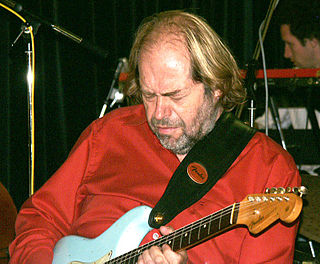
Raymond 'Ray' Russell is an English session musician who is primarily a guitarist. He is also a record producer and composer.

John Lennon's musical instruments were both diverse and many, and his worldwide fame resulted in his personal choices having a strong impact on cultural preferences.
During 1965, The Beatles toured Europe.
Jon Baddeley is a fine art auctioneer, an authority on scientific instruments and collectables, a broadcaster and an author.
The Roy Orbison/The Beatles Tour was a 1963 concert tour of the United Kingdom by Roy Orbison and the Beatles. Other acts on the tour included Gerry and the Pacemakers, David MacBeth, Louise Cordet, Tony Marsh, Terry Young Six, Erkey Grant, and Ian Crawford. It was Orbison's first, and the Beatles' third nationwide tour of the UK. Although Orbison was originally intended to be the headlining act, the reaction to the Beatles on the tour caused them to be promoted to co-headliners, with the Beatles closing the set in the traditional headlining spot.

